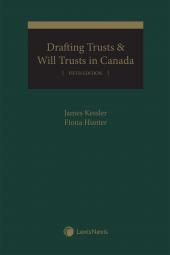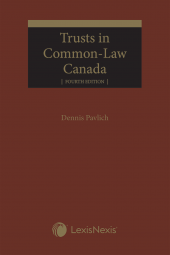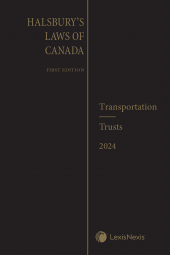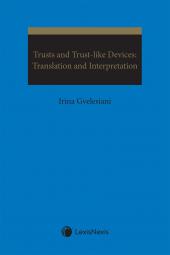Trusts and Trust-like Devices: Translation and Interpretation
One Year Subscription Only Terms
Subscribers receive the product(s) listed on the Order Form and any Updates made available during the annual subscription period. Shipping and handling fees are not included in the annual price.
Subscribers are advised of the number of Updates that were made to the particular publication the prior year. The number of Updates may vary due to developments in the law and other publishing issues, but subscribers may use this as a rough estimate of future shipments. Subscribers may call Customer Support at 800-833-9844 for additional information.
Subscribers may cancel this subscription by: calling Customer Support at 800-833-9844; emailing customer.support@lexisnexis.com; or returning the invoice marked 'CANCEL'.
If subscribers cancel within 30 days after the product is ordered or received and return the product at their expense, then they will receive a full credit of the price for the annual subscription.
If subscribers cancel between 31 and 60 days after the invoice date and return the product at their expense, then they will receive a 5/6th credit of the price for the annual subscription. No credit will be given for cancellations more than 60 days after the invoice date. To receive any credit, subscriber must return all product(s) shipped during the year at their expense within the applicable cancellation period listed above.
Détails des produits
In this new release, scholar Irina Gvelesiani offers a comprehensive look at common law trusts as well as the trust-like mechanisms that have developed in non-trust states, with a particular focus on the “linguistic landscape” that surrounds them and informs how they are interpreted and applied.
After examining the “interconnectedness of language and law” in the opening chapter, Trusts and Trust-like Devices: Translation and Interpretation provides a general overview of common law trusts before delving into a linguistic-juridical analysis of the trust-like mechanisms that are in use in Germany, Austria, France, Romania, Switzerland, Luxembourg, Canada, Georgia and Russia. Throughout the text, Gvelesiani emphasizes the challenges that often accompany the translation and interpretation of the terms and concepts related to trusts and trust-like devices.
Broad application Intended for linguists, legal translators, lawyers and legal practitioners – and available in an affordable and accessible format – this book would be especially useful in assisting anyone involved in the creation and translation of judicial documents and texts.
This new publication has international appeal and will be an important resource for:
- Lawyers and judges who are involved in the resolution of legal disputes associated with the misinterpretation of the law as is relates to entrusting relationships in Canada and some European countries
- Law students who can use it as a supplementary reference volume for undergraduate and graduate courses on trust law, legal translation and interpretation
- Linguists who need guidance on the development and interpretation of judicial documents and texts
- Law libraries who want to offer patrons a research and reference tool for learning about trusts and trust-like devices on the international stage
Table des matières
Introduction
Part I: Language and law
Part II: The common law trust (The general overview)
Part III: The German trust-like mechanisms (Analysis)
Part IV: The Austrian trust-like devices
Part V: The French fiducie
Part VI: The Romanian fiducia
Part VII: The Swiss trust-like devices
Part VIII: The Luxembourgish fiducie
Part IX: The Canadian trust-like mechanisms
1.1 The historical background
1.2 The contemporary situation
1.2.1 The components of entrusting relationships
1.2.2 The fiduciary ownership
1.2.3 The classification of Quebecoise trusts
1.2.4 The linguistic situation
1.2.5 The common law trust and the Quebecoise fiducie
1.2.6 Terminological incompatibility
Part X: Georgia’s trust-like mechanism
Part XI: Russia’s trust-like mechanism
Part XII: Final remarks
Produits liés
-
 Drafting Trusts and Will Trusts in Canada, 5th Edition + USB275,00 $
Drafting Trusts and Will Trusts in Canada, 5th Edition + USB275,00 $ -
Nouveau!Précommander
 Trusts in Common-Law Canada, 4th EditionNouveau!150,00 $
Trusts in Common-Law Canada, 4th EditionNouveau!150,00 $ -
 Halsbury's Laws of Canada – Transportation (Carriage of Goods) (2024 Reissue) / Transportation (Railways) (2024 Reissue) / Trusts (2024 Reissue)335,00 $
Halsbury's Laws of Canada – Transportation (Carriage of Goods) (2024 Reissue) / Transportation (Railways) (2024 Reissue) / Trusts (2024 Reissue)335,00 $
 Lexis Nexis
Lexis Nexis 